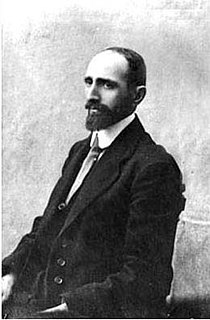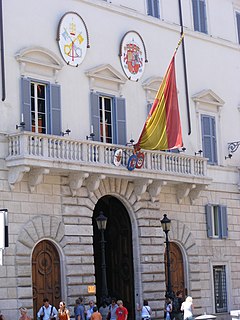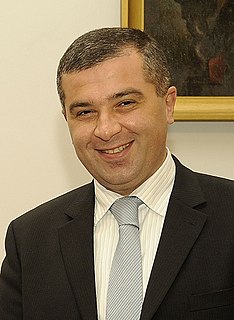Salome Zurabishvili სალომე ზურაბიშვილი | |
|---|---|
 | |
| President of Georgia | |
| Assumed office 16 December 2018 | |
| Prime Minister | Mamuka Bakhtadze |
| Preceded by | Giorgi Margvelashvili |
| Minister of Foreign Affairs | |
| In office 20 March 2004 –18 October 2005 | |
| President | Mikheil Saakashvili |
| Preceded by | Tedo Japaridze |
| Succeeded by | Gela Bezhuashvili |
| Personal details | |
| Born | 18 March 1952 Paris, France |
| Political party | Way of Georgia (2006–2011) [1] Independent (2011–present) |
| Spouse(s) | Nicolas Gorjestani (Divorced) Janri Kashia (1993–d.2012) |
| Children | 2 |
| Residence | Tbilisi, Georgia |
| Education | Sciences Po Columbia University |
| Signature | |
Salome Zurabishvili (Georgian :სალომე ზურაბიშვილი, French : Salomé Zourabichvili; born 18 March 1952) is a Georgian politician and former French diplomat who currently serves as the President of Georgia, in office since December 2018. She is the first woman to be elected as Georgia's president in permanent capacity [2] and will occupy this position for a term of six years. As a result of constitutional changes coming into effect in 2024, Zurabishvili is expected to be Georgia's last popularly elected president; all future heads of state are to be elected indirectly by an electoral college.
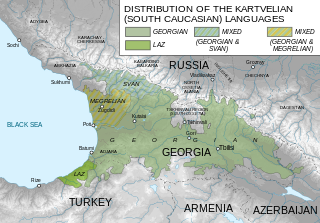
Georgian is a Kartvelian language spoken by Georgians. It is the official language of Georgia.

French is a Romance language of the Indo-European family. It descended from the Vulgar Latin of the Roman Empire, as did all Romance languages. French evolved from Gallo-Romance, the spoken Latin in Gaul, and more specifically in Northern Gaul. French was also influenced by native Celtic languages of Northern Roman Gaul like Gallia Belgica and by the Germanic Frankish language of the post-Roman Frankish invaders. Today, owing to France's past overseas expansion, there are numerous French-based creole languages, most notably Haitian Creole. A French-speaking person or nation may be referred to as Francophone in both English and French.

Georgia is a country in the Caucasus region of Eurasia. Located at the crossroads of Western Asia and Eastern Europe, it is bounded to the west by the Black Sea, to the north by Russia, to the south by Turkey and Armenia, and to the southeast by Azerbaijan. The capital and largest city is Tbilisi. Georgia covers a territory of 69,700 square kilometres (26,911 sq mi), and its 2017 population is about 3.718 million. Georgia is a unitary semi-presidential republic, with the government elected through a representative democracy.
Contents
- Early life and education
- Career
- Career in diplomacy
- Minister of Foreign Affairs, 2004–2005
- Political career
- Residence and funding
- Political positions
- Personal life
- Works
- References
- External links
Zurabishvili was born in Paris into a family of Georgian émigrés. She joined the French diplomatic service in the 1970s and went on to occupy a variety of senior diplomatic positions for three decades. From 2003 to 2004, she served as the Ambassador of France to Georgia. In 2004, by mutual agreement between France and Georgia, she accepted the Georgian nationality and became the Foreign Minister of Georgia. During her tenure at the Georgian MFA, she negotiated a treaty that led to the withdrawal of Russian forces from the undisputed parts of the Georgian mainland. She has also served at the UN Security Council’s Iran Sanctions Committee as the Coordinator of the Panel of Experts.

Paris is the capital and most populous city of France, with an area of 105 square kilometres and an official estimated population of 2,140,526 residents as of 1 January 2019. Since the 17th century, Paris has been one of Europe's major centres of finance, commerce, fashion, science, and the arts.

France, officially the French Republic, is a country whose territory consists of metropolitan France in Western Europe and several overseas regions and territories. The metropolitan area of France extends from the Mediterranean Sea to the English Channel and the North Sea, and from the Rhine to the Atlantic Ocean. It is bordered by Belgium, Luxembourg and Germany to the northeast, Switzerland and Italy to the east, and Andorra and Spain to the south. The overseas territories include French Guiana in South America and several islands in the Atlantic, Pacific and Indian oceans. The country's 18 integral regions span a combined area of 643,801 square kilometres (248,573 sq mi) and a total population of 67.3 million. France, a sovereign state, is a unitary semi-presidential republic with its capital in Paris, the country's largest city and main cultural and commercial centre. Other major urban areas include Lyon, Marseille, Toulouse, Bordeaux, Lille and Nice.

The United Nations Security Council (UNSC) is one of the six principal organs of the United Nations (UN), charged with the maintenance of international peace and security as well as accepting new members to the United Nations and approving any changes to its United Nations Charter. Its powers include the establishment of peacekeeping operations, the establishment of international sanctions, and the authorization of military action through Security Council resolutions; it is the only UN body with the authority to issue binding resolutions to member states. The Security Council held its first session on 17 January 1946.
After a falling out with Georgia's then President Mikheil Saakashvili, in 2006 Zurabishvili founded The Way of Georgia political party, which she led until 2010. Ultimately, she was elected to the Georgian Parliament in 2016 as an independent; she vacated her parliamentary seat after being sworn in as President. During the 2018 Georgian presidential election, Zurabishvili ran as an independent candidate and was supported by the governing Georgian Dream party. She prevailed in a run-off vote against Grigol Vashadze.

Mikheil Saakashvili is a Georgian and Ukrainian politician. He was the third President of Georgia for two consecutive terms from 25 January 2004 to 17 November 2013. From May 2015 until November 2016, Saakashvili was the Governor of Ukraine's Odessa Oblast. He is the founder and former chairman of the United National Movement party.
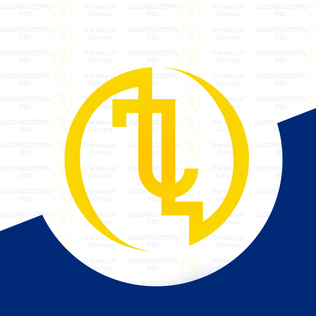
The Way of Georgia is a political party in Georgia. It was registered on March 11, 2006. The party is led by the former Georgian Foreign Minister Salome Zourabichvili. The Party leans towards some form of liberalism.

The Parliament of Georgia the supreme national legislature of Georgia. It is a unicameral parliament, currently consisting of 150 members; of these, 77 are proportional representatives and 73 are elected through single-member district plurality system, representing their constituencies. According to the 2017 constitutional amendments, the Parliament will transfer to fully proportional representation in 2024.

